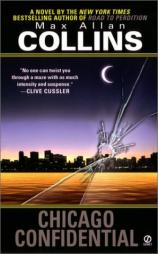Chicago Confidential: A Nathan Heller Novel
Review
Chicago Confidential: A Nathan Heller Novel
Max Allan Collins needs no introduction to aficionados of the
mystery genre. His bonafides are well established, from scripting
the Dick Tracy comic strip to writing the graphic novel ROAD TO
PERDITION (recently adapted, with much fanfare, for theatrical
release) to co-editing with Jeff Gelb the FLESH & BLOOD
original mystery anthology series. His long-running labor of love,
however, has been his Nathan Heller novels. The Heller novels have
functioned as a vehicle for Collins to mix fact with fiction in
order to explore some of the last century's most notorious crimes,
utilizing celebrities of the era as a name-checking backdrop. The
books have accordingly covered such crimes as the Lindbergh
kidnapping (STOLEN AWAY) and, most recently, the Black Dahlia
murder (ANGEL IN BLACK). While the series was originally set in
Chicago, the last nine or so have had Heller straying from those
environs. Now, with CHICAGO CONFIDENTIAL, he returns to the Windy
City, using the Estes Kefauver investigation into organized crime
as a vehicle for a fast-paced tale of murder and deceit.
The Kefauver Commission's investigation was the nation's first
inquiry into organized crime. Heller is no stranger to this world;
though he never worked directly for any mobsters, he was employed
by their attorneys. He consequently knows where more than a few
bodies are buried. Many of the high-level, high-powered gangsters
with whom he crossed paths don't trust him to keep his mouth shut.
Heller, however, plans to stay quiet, pleading the Fifth Amendment
if subpoenaed, but Bill Drury, Heller's private investigation
partner is cooperating with the authorities. Spurred on in part by
revenge and in part by his sense of duty, Drury becomes the target
of an assassination. Heller is then motivated to take on the mob.
Heller being Heller, however, he doesn't utilize the hearings or
the courts, turning instead to his own version of swift, sure and
brutal justice. Heller, along the way, rubs elbows with the famous
and the soon-to-be famous, from Frank Sinatra on the (temporary)
downside of his career, to a young, undiscovered Jayne Mansfield,
to a shady, second-tier underworld character who goes by the name
of Jack Ruby. Collins's historical research into the people and
places that populate CHICAGO CONFIDENTIAL is exacting, and older
readers especially will find the trip down memory lane at once
entertaining and winsomely nostalgic.
Collins plans to continue moving forward in time in his future
Heller novels. Although it will undoubtedly be awhile, one cannot
help but look ahead to Collins's take on such occurrences as the
death of Marilyn Monroe and the John Kennedy assassination. In the
interim, Collins will no doubt continue to build upon a series that
is becoming a compendium of mid-20th Century crime using the genre
of historical fiction as a vehicle.
Reviewed by Joe Hartlaub on January 21, 2011





